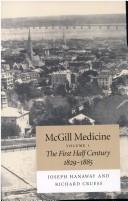| Listing 1 - 2 of 2 |
Sort by
|

ISBN: 1282853503 9786612853500 0773565523 9780773565524 0773513248 9780773513242 Year: 1996 Publisher: Montreal London McGill-Queen's University Press
Abstract | Keywords | Export | Availability | Bookmark
 Loading...
Loading...Choose an application
- Reference Manager
- EndNote
- RefWorks (Direct export to RefWorks)
Founded by four Scottish physicians, the McGill School of Medicine opened in 1829. Teaching style in the school followed the so-called Edinburgh tradition, which for decades emphasized anatomy and clinical observation and ignored progressive educational theory and scientific advances. Out of this conservative environment, however, emerged four remarkable young professors who would lead the reform that marked a new era in medicine at McGill. William Osler, Francis Shephard, Thomas Roddick, and George Ross introduced laboratory training to teach students the scientific method in a hands-on environment and to encourage them to develop a more sophisticated approach to clinical medicine and surgery. McGill Medicine: Volume 1 records not only the history of Canada's premier medical school but also the evolution of scientific medical education in Lower Canada.
McGill University. --- History. --- Universities and colleges
Book
ISBN: 1282863770 9786612863776 077357316X Year: 2006 Publisher: Montreal ; Buffalo : McGill-Queen's University Press,
Abstract | Keywords | Export | Availability | Bookmark
 Loading...
Loading...Choose an application
- Reference Manager
- EndNote
- RefWorks (Direct export to RefWorks)
McGill Medicine is also the story of the doctors and administrators who made all this happen: visionaries such as Principal Sir Arthur Currie and Dr C.F. Martin, who shepherded the concept of full-time faculty through the various approval processes of the school; Dr J.C. Meakins, who became, in 1924, the first full-time professor of medicine; and Dr Wilder Penfield, the founder and first director of the Montreal Neurological Institute, among many others.
Medical education --- McGill University. --- McGill University --- History.
| Listing 1 - 2 of 2 |
Sort by
|

 Search
Search Feedback
Feedback About UniCat
About UniCat  Help
Help News
News